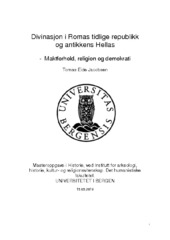| dc.contributor.author | Jacobsen, Tomas Eide | |
| dc.date.accessioned | 2019-06-13T01:25:19Z | |
| dc.date.available | 2019-06-13T01:25:19Z | |
| dc.date.issued | 2019-06-13 | |
| dc.date.submitted | 2019-06-12T22:00:33Z | |
| dc.identifier.uri | https://hdl.handle.net/1956/19979 | |
| dc.description.abstract | I denne masteroppgaven skal jeg se på maktstrukturer innenfor divinasjon sett fra et politisk standpunkt innenfor bystatene Athen, Sparta og Roma. Dette er med målet om å se hvordan maktstrukturene rundt divinasjon og religion påvirker demokrati og demokratisk utvikling i disse bystatene, med tanke på om demokratiet eksisterer ved siden av disse strukturene eller til tross for disse. Perioden jeg sikter meg inn på er Athen og Spartas storhetstid fra Athens demokratis begynnelse, og Romas republikks grunnleggelse. Vi følger Athen og Sparta gjennom Perserkrigene og de Peloponnesiske krigene, og Roma gjennom sin tidlige republikanske periode ca. fra til Lex Ogulnia i 367. f.Kr, men i hovedsak snakker vi om en periode ca fra 508. f. Kr til 411. f.Kr. Mye av oppgaven blir å se på maktstrukturene innenfor divinasjon og religion i disse forskjellige bystatene ved hjelp av mine kilder og forskningslitteratur, før vi til slutt tar for oss en komparativ analyse av disse tre bystatene. I løpet av kapitlene om de forskjellige bystatene ser vi på tema som orakler, ofringer, andre former for divinasjon og også hvordan religionen på politisk nivå ble opplevd av den øvrige befolkningen. Det blir relevant å se på divinasjon i krig og fred, og de forskjellige strukturene som er involvert i dette. Ved siden av den detaljerte gjennomgangen av mine kilder vil jeg også i mindre grad ta i bruk en kvantitativ analyse av hendelser i kildene som er relevante for oppgaven for å få et helhetlig bilde. Kildene som tas i bruk i oppgaven er med tanke på Hellas de som gjerne blir regnet som de første historikerne, nemlig Tukydid og Herodot. Deretter, når vi retter blikket mot Roma, er det Titus Livius sammen med Dionysios og Halikarnassos og deres verk vi skal gjennomgå. Ved hjelp av disse metodene og disse kildene skal vi prøve å danne et bilde av hvem som hadde makten over divinasjon i forskjellige sammenhenger, og hvordan den politiske makten av religion var fordelt. Dette sett da i relasjon til hvordan demokratiet eksisterte på siden av dette og hvordan utviklingen ledet an. | en_US |
| dc.description.abstract | In this master thesis I will be discussing the subject of divination seen from a more political perspective in relation to power distribution and how this relates to democracy. This means that I will be looking at if democracy is hindered or not by the power structures within religion and divination. The subjects of my thesis are three city states within a similar timeframe. This is Athens and Sparta at their height during the Persian Wars and the Peloponnesian Wars, and Rome within its early republic at the same timeframe. This means I will be looking at a period of around 508. B.C. to around 411 B.C, though I will look at the later dates as well to a lesser degree in order to get a full picture. It will be a comparative analysis between these three city states in relation to these power structures and I will look at how democracy is affected or not by this. This means looking at the patricians of Rome and their clinging to their old privileges in relation to how it works in Greece, with different relations between democracy and religion. The focus is on divination due to its importance in all these city states and its relation to power structures will be what is interesting to look at for us. The main sources for this thesis will be, for Greece, the classics Herodotus and Thucydides, and for Rome it will be Livy, as well as Dionysius of Halicarnassus in order to have two eyes on the subject. I will be using these to look at specific times were divination has been used and how this relates to how these rights of augury and divination where distributed. To a lesser degree I will also be using a quantitative analysis on the side in order to get the bigger picture outside of the more detailed look. In the end I will look at Athens, Sparta and Rome comparatively and see why these states are so different regarding their look at religion, divination in relation to democratic development. In the first two chapters we look closely at the power distribution in divination and religion with such subjects as priesthoods, augury, sacrifice, oracles and even a look at how the publics relation to religion was in these states. This will perhaps be the meat of the thesis, before we enter the final chapter and look at all these city states comparatively to see what we can find out. | en_US |
| dc.language.iso | nob | |
| dc.publisher | The University of Bergen | |
| dc.title | Divinasjon i Romas tidlige republikk og antikkens Hellas - Maktforhold, religion og demokrati | |
| dc.title.alternative | Divination in early republican Rome and classical Greece | |
| dc.type | Master thesis | |
| dc.date.updated | 2019-06-12T22:00:33Z | |
| dc.rights.holder | Copyright the Author. All rights reserved | |
| dc.description.degree | Historie mastergradsoppgave | |
| dc.description.localcode | MAHF-HIS | |
| dc.description.localcode | HIS350 | |
| dc.subject.nus | 713107 | |
| fs.subjectcode | HIS350 | |
| fs.unitcode | 11-22-0 | |
